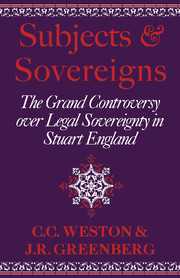Book contents
- Frontmatter
- Contents
- Dedication
- Preface
- 1 The shift in political thought
- 2 The keeper of the kingdom
- 3 The new age of political definition
- 4 That ‘Poisonous Tenet’ of co-ordination
- 5 The curious case of William Prynne
- 6 The idiom of restoration politics
- 7 Co-ordination and coevality in exclusion literature
- 8 The law-makers and the dispensing power
- Appendix: Co-ordination and resistance at the Revolution
- Notes
- Bibliography
- Index
2 - The keeper of the kingdom
Published online by Cambridge University Press: 08 October 2009
- Frontmatter
- Contents
- Dedication
- Preface
- 1 The shift in political thought
- 2 The keeper of the kingdom
- 3 The new age of political definition
- 4 That ‘Poisonous Tenet’ of co-ordination
- 5 The curious case of William Prynne
- 6 The idiom of restoration politics
- 7 Co-ordination and coevality in exclusion literature
- 8 The law-makers and the dispensing power
- Appendix: Co-ordination and resistance at the Revolution
- Notes
- Bibliography
- Index
Summary
Of the two political ideologies, it was the royalist that was more firmly rooted in English experience and tradition of the late sixteenth and early seventeenth centuries. It grew out of the theory of order that distinguished late Tudor and early Stuart political thought, nourished and sustained in turn by a network of legal and constitutional ideas concerning kingship. Prominent among the Tudor and early Stuart Englishmen who wrote in terms of the order theory was the eminent common lawyer, Sir Edward Coke, whose judicial and parliamentary careers spanned Elizabeth I's and James I's reigns and included the first years of Charles I. Taking a high view of the royal position – unexpectedly so for an authority whom the parliamentarians revered as the oracle of the law – Coke wrote that ‘the kingdom of England is an absolute monarchy’, of which ‘the king is the only supreme governor’, having been empowered ‘immediately of almighty God’. He was, according to the ancient laws of the realm, the kingly head of the body politic, and as such he possessed ‘plenary and entire power, prerogative, and jurisdiction’. The purpose of this power was ‘to render justice and right to every part and member of this body …; otherwise he should not be a head of the whole body’. The language sounds like hyperbole but was by no means unusual in discussions of the kingship. To another lawyer, Henry Finch, the king was the head of the commonwealth immediately under God.
- Type
- Chapter
- Information
- Subjects and SovereignsThe Grand Controversy over Legal Sovereignty in Stuart England, pp. 8 - 34Publisher: Cambridge University PressPrint publication year: 1981



